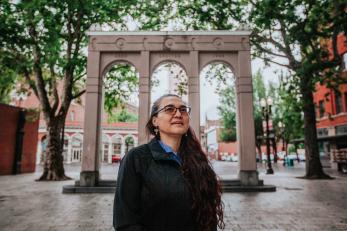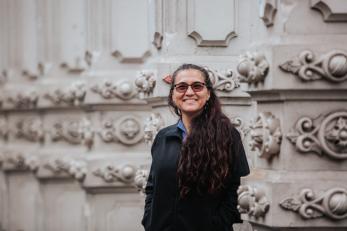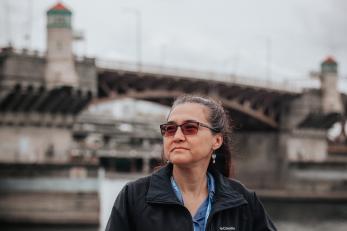Community resilience: Meet preparedness advocate Alicia Bashir

Alicia Bashir’s life changed when she attended her first Preparedness Advocate Workshop at Mercy Corps Northwest that introduced her to the notion of Oregon’s impending earthquake. The coastal region spanning from California to Canada is due for a massive earthquake over the next 50 years – one that will wipe out a large section of civilization along the west coast – at cause of the Cascadia Subduction Zone. It’s impossible to predict exactly when the big one will strike, but according to statistics, the region is overdue for what may be one of modern history’s worst natural disasters.
Bashir learned about the class through an email from her kid’s school. She says she jumped on it immediately when the saw the words “learning, information, disaster.” Protecting her four children was the major motivating factor in learning how to prepare for an emergency.
“As a parent of four kids, being prepared for a disaster of any kind is very important to me because I worry about them constantly. As a community member, I wanted other parents to know about it. I was also worried about the kids they went to school with. I wanted to see what I could learn and teach my kids and their friends,” she said. As a Spanish speaker, Bashir was also looking to share information about preparing for a disaster beyond the local English-speaking population.

Safety preparation
What scares Bashir the most is being away from her children when the earthquake hits. She thinks about what she would do if her family were separated by the Willamette River which bisects Portland. Her fears come with good reason, as it is possible none of Portland’s many bridges will be able to withstand the quake, leaving residents isolated on one of the city’s two sides.
Bashir recently had a small fire in their home which she used as a learning opportunity to teach her children about preparedness. Her family went over the events of the small house fire together. For example, the neighbors may be able to smell smoke but unable to hear the fire alarms going off inside the house.
To combat this, Bashir has since place alarms on the exterior of the house. She also got her daughter a rope ladder so she will have a way to escape from her room that has a window 30 feet above the ground. “She thinks I’m crazy, but I was going to blindfold us both and go out the window with the ladder. I’m going to do it safely, but I’m afraid for her and want her to develop muscle memory,” she says.
Bashir understands that if someone is in panic mode, but has practiced operating in emergency situations, muscle memory could be helpful. For instance, if you have practiced feeling a door with the back of your hand in a house fire situation, it may spare someone from burning their palm.

In teaching earthquake preparedness classes, Bashir remarks that it's common for people to have never heard about the Cascadia Subduction Zone. In her classes, she tells residents how to make affordable emergency kits, which is something most appreciate.
She also explains how to access the water heater for drinking, but warns there is a proper way to do it. Water is the most important thing for keeping humans and pets alive. “I never judge people for over-preparing, whether in or before an emergency. Nothing comes ahead of keeping your family safe.”
To learn more about our resilience programs across the globe click here.